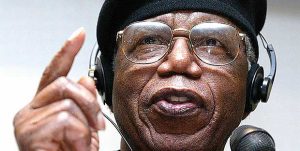Everything About Chinua Achebe Biography, Wikipedia, Age, Husband, State Of Origin

One of Nigeria’s greatest authors is Chinua Achebe. Although he primarily writes for an African readership, his works have achieved a global appeal after being translated into more than forty other languages.
Chinua Achebe (born Albert Chinualumogu Achebe; November 16, 1930–March 21, 2013) was a Nigerian writer described by Nelson Mandela as one “in whose company the prison walls fell down.”
He is best known for his African trilogy of novels documenting the ill effects of British colonialism in Nigeria, the most famous of which is “Things Fall Apart.”
Chinua Achebe was born in Ogidi, Eastern Nigeria, on November 15, 1930. He was the fifth kid of six, and his family belonged to the Igbo tribe.
His parents, Isaiah Okafor Achebe and Janet Ileogbunam, were persuaded to convert from their traditional religion to Christianity by representatives of the British government, which ruled Nigeria. Achebe was raised a Christian, although he was also interested in the more traditional Nigerian religions.
At Umuahia, Nigeria, he attended a government college before earning his degree in 1954 from the University College in Ibadan, Nigeria.
Although Achebe was raised as a Christian, many of his relatives continued to follow their ancient polytheistic religion. His early education was received in a local school where Igbo language use was prohibited and parents’ religion was pushed to be disowned.
Achebe was enrolled at the age of 14 to the Government College at Umuahia, a prestigious boarding school. The poet Christopher Okigbo, a classmate of Achebe’s, became a longtime friend.
Achebe received a scholarship to study medicine at the University of Ibadan in 1948, but after a year he switched to writing. He majored in history, theology, and English language and literature in college.
Achebe earned his degree from the University of Ibadan in 1953, and shortly after, he started writing scripts for the Nigerian Broadcasting Service.
He eventually rose to the position of chief programmer for the debate series. For the first time, he traveled to London in 1956 to attend a BBC training session.
He relocated to Enugu after his return and worked as an editor and story producer for the NBS. He put “Things Fall Apart” to work in his free time. 1958 saw the release of the book.
The last ten years before Nigeria gained independence are the focus of his 1960 book “Never Longer at Rest,” his second book.
The grandson of Okwonko, who adapts to British colonial society, is the book’s main character (including political corruption, which causes his downfall).
They finally had four children: daughters Chinelo and Nwando, twin sons Ikechukwu and Chidi, and a daughter named Chinelo.
In 1961, Chinua Achebe met Christiana Chinwe Okoli and they were married. In 1964, “Arrow of God,” the third novel in the African trilogy, was released.
It talks about an Igbo priest named Ezeulu, who sends his son to be schooled by Christian missionaries, where the boy is converted to colonialism and attacks Nigerian religion and culture.
On March 21, 2013, Achebe passed away in Boston, Massachusetts, following a brief illness. He is recognized for redefining writing by illustrating the impacts of European colonization from an African perspective.
He chose to write in English particularly, a decision that drew some criticism, but his goal was to inform the entire world of the actual issues that Western colonialists and missionaries in Africa had brought about.
Achebe got more than 30 honorary doctorates in addition to winning the 2007 Man Booker International Award for his lifetime’s work.
He continued to criticize the corrupt practices of Nigerian politicians, denouncing those who stole or wasted the country’s oil assets. Along with being a successful author himself, he was a fervent and active promoter of African writers.


Leave a Reply